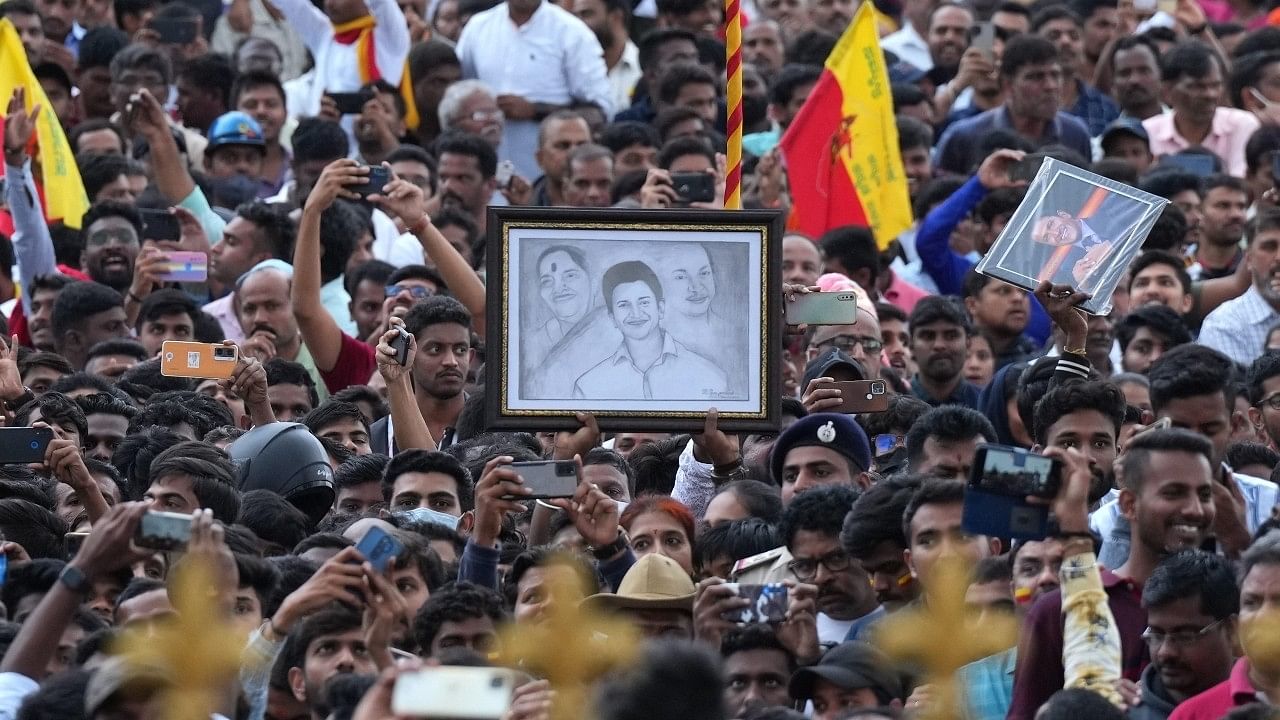
Named after famous Kannada actor Puneeth Rajkumar, who died of a heart attack on October 29, 2021 at the age of 46, the programme aims to treat patients within the 'golden hour', the period which is crucial to save people who suffer a cardiac arrest.
Credit: PTI Photo
Bengaluru: In view of the rise in cardiac arrest related cases, especially among the youth, Karnataka Health Minister Dinesh Gundu Rao on Tuesday announced the launch of Dr Puneeth Rajkumar Hrudaya Jyoti Yojana aimed at providing treatment to people suffering sudden heart attacks.
Named after famous Kannada actor Puneeth Rajkumar, who died of a heart attack on October 29, 2021 at the age of 46, the programme aims to treat patients within the 'golden hour', the period which is crucial to save people who suffer a cardiac arrest.
'We are introducing Karnataka Ratna Dr Puneeth Rajkumar Hriday Jyoti Yojana in the name of Puneeth Rajkumar. The programme has been implemented in two ways. Hub and spoke model and installation of automated external defibrillator (AED) devices in public places,' Rao told reporters.
Recently, it has been noticed that young people are suffering heart attacks, the minister said, adding it is a worrying fact and according to a study, 35 per cent of those who suffer heart attacks were in their 40s.
Noting that it is very important to treat heart attack patients within the golden hour, Rao said he felt that it was his first duty as the Health Minister to rush to the aid of common people.
'In cases of cardiac arrest, as many lives as possible should be saved. Again within the golden hour, they should be treated on time. Our health department has taken a significant step in this regard,' the Minister explained.
Explaining, he said the programme has been implemented in two ways – Hub and spoke model and installation of automated external defibrillator (AED) devices in public places.
The hub and spoke model is a distribution network that resembles a bicycle wheel. The hub and spoke model will work effectively in preventing sudden cardiac arrests.
The Minister said the government is making 85 district and Taluk hospitals as 'spoke' centres. Ten hubs have been created in a total of 16 super-specialty hospitals including Sri Jayadeva Institute of Cardiovascular Sciences and Research.
Anyone who experiences chest pain, should visit the spoke centres and get an ECG immediately, the minister said.
Rao pointed out that through AI technology, it can be detected within four to five minutes whether their condition is critical or not.
With the help of Tricog's AI technology, a system has been designed to detect critical or non-critical problems, he added.
Those in critical stage will be given Tenecteplase injection free of charge at the spoke centres which are Taluk level hospitals, the minister said, adding this injection is very effective in preventing a sudden cardiac arrest.
This treatment, the minister said, will be helpful in preventing an immediate heart attack for those who are in the critical stage.
'Private hospitals charge Rs 30,000 to Rs 45,000 for one Tenecteplase injection. However, we have decided to provide this injection free of charge in our government hospitals,' he explained.
After treatment at spoke centres in Taluk or District Hospitals, the patient will be sent to hub centres of Super Specialty Hospitals for further treatment with the help of an ambulance, where advanced medical care including angiogram or angioplasty will be provided.
'BPL card-holders will also get free treatment in hubs of super specialty hospitals. APL cardholders can get free treatment under our Arogya Karnataka Ayushman Bharat Health Card,' Rao said.
As many as 45 spoke centres are connected to three hubs of Jayadeva Cardiology Institute in Bengaluru, Mysuru and Kalaburagi Hospitals. These include 35 taluk hospitals and 10 district hospitals, he said.
Further, the Health department has created seven hubs including 13 super-specialty hospitals in collaboration with government medical college hospitals and some private medical institutions.
These hubs are linked with 40 spoke centres, comprising 34 taluk and six district hospitals.
'Together, we will form 10 hubs and spoke centres in 85 taluk and district hospitals across 31 districts of the entire state. The intention of the programme is to save the lives of those suffering sudden heart attacks,' Rao said.
The self-powered Automated External Defibrillator devices will be installed in public places including bus stands, railway stations, airports, Vidhana Soudha, courts, etc, the minister said.
'Apart from Bengaluru, these AED devices will be placed in public places in major cities of the state, in highly crowded areas. We have planned to install 50 devices in public places across the state,' he said.
It is estimated that the purchase of a single AED device can cost up to Rs. 1.10 lakh. Procurement of these devices is in progress, Rao said.